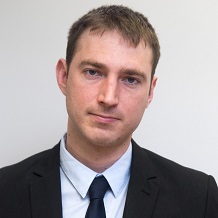 Humanists UK’s Head of Pastoral Support, Simon O’Donoghue, has been elected Chair of the Network for Pastoral, Spiritual, and Religious Care in Health (NPSRCH) for 2018-2020. His election represents the first time a humanist has held the lead role in a national organisation that brings together people of different religions and beliefs to work on pastoral support and chaplaincy. Other members of the Network include the Church of England, Catholic Bishop’s Welfare Advisory Group, National Hindu Council of Temples, Vanik Council UK, Free Churches, and UK Sikh Healthcare Chaplaincy Group.
Humanists UK’s Head of Pastoral Support, Simon O’Donoghue, has been elected Chair of the Network for Pastoral, Spiritual, and Religious Care in Health (NPSRCH) for 2018-2020. His election represents the first time a humanist has held the lead role in a national organisation that brings together people of different religions and beliefs to work on pastoral support and chaplaincy. Other members of the Network include the Church of England, Catholic Bishop’s Welfare Advisory Group, National Hindu Council of Temples, Vanik Council UK, Free Churches, and UK Sikh Healthcare Chaplaincy Group.
The NPSRCH, formerly known as the Healthcare Chaplaincy Faith and Belief Group, is a network of organisations whose key aim is to encourage and support the development of pastoral and spiritual care for all regardless of religion and belief in the NHS in England. To this end, it advises NHS England on pastoral care, raises awareness of it among people of different religions or beliefs, and supports the training and education of pastoral support volunteers, amongst other activities.
As well as working for Humanists UK, Simon also serves as the Coordinator of the Non-Religious Pastoral Support Network (NRPSN), a national network of non-religious pastoral carers administered by Humanists UK. It is in this capacity that he has been elected Chair of Council for the Network for Pastoral, Spiritual, and Religious Care in Health. The NRPSN now has staff or volunteers in over a quarter of NHS Trusts in England and Wales.
The growth of non-religious pastoral support began in 2015 when NHS England published new national guidance which, for the first time, called on NHS bodies to provide pastoral care to non-religious people on the same terms as chaplaincy is provided to the religious.
Simon’s election as Chair of the NPSRCH follows Lindsay van Dijk’s appointment as the first humanist head of an NHS Chaplaincy and Pastoral Support team in April. Non-religious pastoral care is growing in popularity with research commissioned by Humanists UK showing that there is widespread demand for access to non-religious pastoral care.
On his appointment, Simon O’Donoghue commented, ‘I am delighted to have been elected Chair of the Network for Pastoral, Spiritual, and Religious Care in Health for the next two years. I look forward to working with NHS England, with religious groups, and with Humanists UK to take forward my new role and helping to meet the pastoral needs of all those in healthcare. Speaking personally, I think my election is a sign that the demand for pastoral care for the non-religious is increasingly recognised and valued, a much needed change.’
Notes
For further comment or information contact Richy Thompson, Director of Public Affairs and Policy at richy@humanists.uk or 020 7324 3072.
Humanists UK works for an end to irrelevant religious discrimination in publicly funded posts such as general pastoral support jobs in hospitals and elsewhere, which are often unfairly reserved only for religious people or people of certain religions, and for equal treatment of the non-religious according to need in the limited number of settings where belief-specific services are legitimately provided, including hospitals.
Read more about our provision of non-religious pastoral support: https://humanists.uk/community/humanist-pastoral-support/
The NRPSN: http://nrpsn.org.uk/
The NPSRCH: http://hcfbg.org.uk/
Read more about our campaigns work on chaplaincy and pastoral support: https://humanists.uk/campaigns/human-rights-and-equality/chaplaincy-and-pastoral-support/
Research by Humanists UK shows that the term ‘chaplain’ is generally understood to be one that exclusively applies to Christians, and this can be a barrier to non-religious people in accessing non-religious pastoral support. For this reason Humanists UK uses the more descriptive terms ‘pastoral support’ and ‘pastoral care’ to describe its work.
